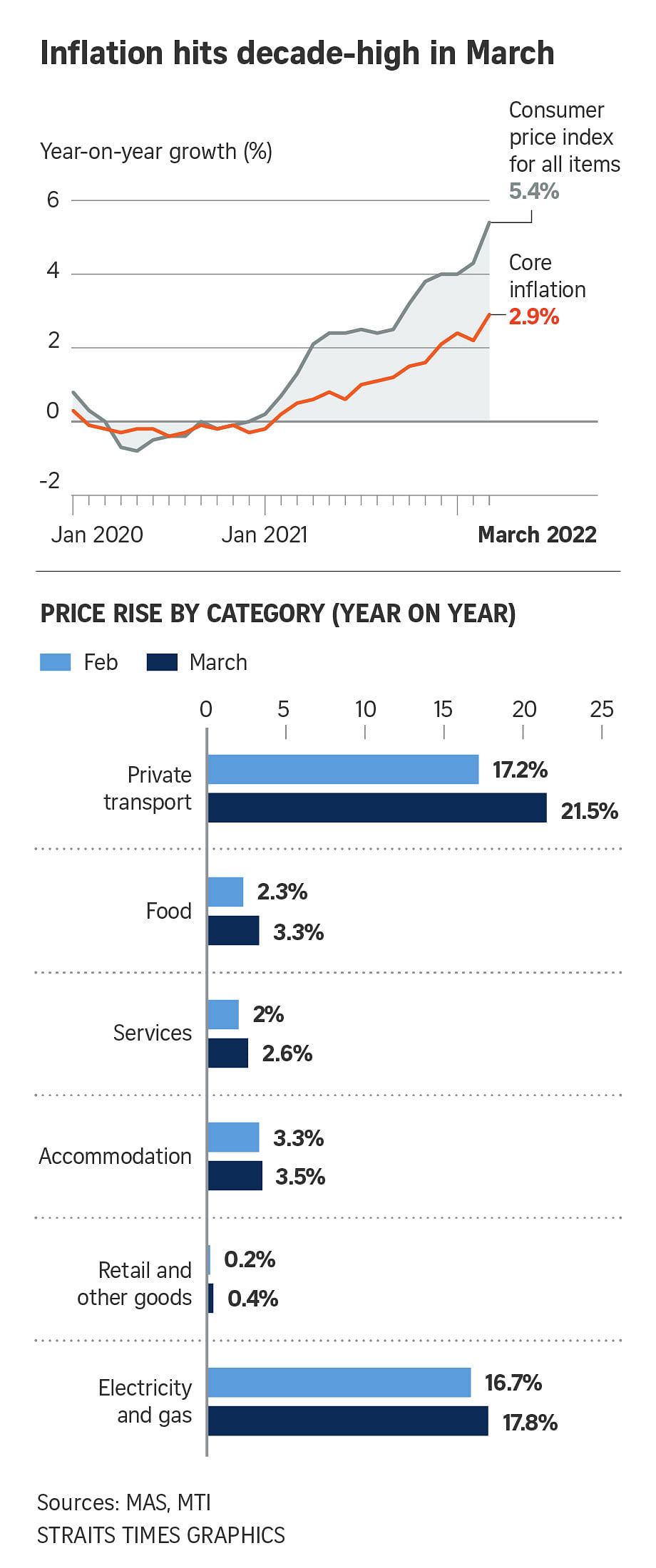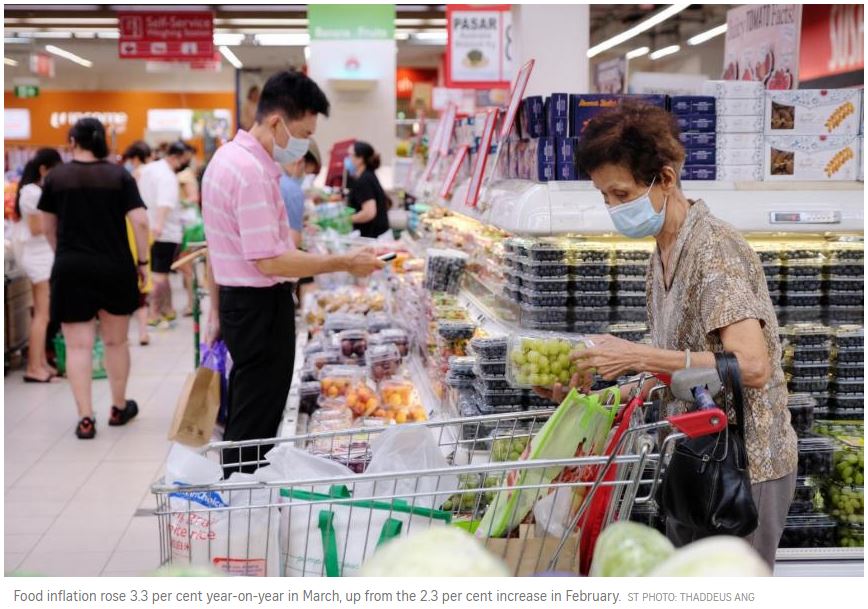Singapore inflation jumps to 10-year high in March on higher food, services and transport prices
SINGAPORE – Consumer prices in Singapore saw a spike last month on the back of higher food, services and private transport costs, with inflation hitting a 10-year high, according to data released on Monday (April 25).
Core inflation – which excludes accommodation and private transport costs – jumped to 2.9 per cent in March on a year-on-year basis, from 2.2 per cent the previous month.
This topped the 2.5 per cent rise forecast by economists in a Bloomberg poll, and was the highest rate seen since March 2012.
Core inflation is forecast to pick up further in the coming months, before moderating towards the end of the year as some of the external inflationary pressures ease, the Monetary Authority of Singapore (MAS) and the Ministry of Trade and Industry (MTI) said in a joint statement on Monday.
Overall, consumer prices spiked by 5.4 per cent last month, more than the 4.3 per cent increase the month before and the fastest pace since April 2012.
On a month-on-month basis, core inflation increased by 0.7 per cent in March, while overall consumer prices rose 1.2 per cent.
External inflationary pressures have intensified amid sharp increases in global commodity prices and supply chain disruption, and these conditions are likely to persist, MAS and MTI said.
At the same time, the labour market is expected to remain tight in Singapore and support consistent wage increases over the year.
“Amid improving demand, greater pass-through of accumulating business costs to consumer prices is likely to occur, keeping core inflation significantly above its historical average through the year,” the two agencies said.
In addition, overall inflation is expected to pick up by more than core inflation this year, as private transport and accommodation inflation is expected to stay firm in the near term, they added.
Private transport inflation was up 21.5 per cent in March, compared with the 17.2 per cent increase in February, due to a larger increase in car and petrol prices.
Food inflation rose 3.3 per cent year on year in March, up from the 2.3 per cent increase in February, as the prices of both non-cooked food and food services increased at a faster pace.
Services inflation was higher at 2.6 per cent in March, compared with 2 per cent in February, primarily due to a larger increase in the cost of other transport services and holiday expenses. The costs of recreational and cultural services and point-to-point transport services also picked up more strongly.
Electricity and gas prices also rose at a faster pace of 17.8 per cent in March, compared with the 16.7 per cent increase in February, with the average electricity prices paid by households under the open electricity market seeing a larger increase, against the backdrop of higher global oil prices.
OCBC Bank chief economist Selena Ling noted that given that the global tide of hawkish central banks hiking interest rates, it remains to be seen if the frontloading of monetary policy tightening will be enough to combat imported inflation or potentially risk stagflation as the increase in prices hurt business and consumer confidence.
“On hindsight, this consumer price index print underscores the need for the aggressive twin tightening move by the MAS (earlier in April), and also explains why the window to further tightening (in its October policy statement) may not be closed just yet,” she said.
Earlier this month, Singapore’s central bank took a more aggressive double-barrelled move to tighten monetary policy, in a bid to slow the inflation momentum.
It recentred the midpoint of the exchange rate policy band at the prevailing level, and slightly increased the rate of appreciation of the policy band.
MAS had also raised its inflation forecasts for 2022 in its policy statement, citing sharp gains in global commodity prices since late February and renewed supply chain disruptions brought about by both the Ukraine war and the Covid-19 pandemic.
It expects core inflation to come in at 2.5 per cent to 3.5 per cent this year, versus a prior forecast of 2 per cent to 3 per cent. Overall inflation is forecast at 4.5 per cent to 5.5 per cent, up from the earlier range of 2.5 per cent to 3.5 per cent.
Maybank analysts Chua Hak Bin and Lee Ju Ye said in a report that currency appreciation may not be sufficient to contain the intensifying inflation pressures nor ease the tightness in the job market, and suggested that foreign labour policies and plans to introduce the local qualifying salary of $1,400 may need to be reviewed.
“A supplementary budget may be necessary to ease the burden from the rising costs of living for lower-income households,” they added.

Source: https://www.straitstimes.com/business/economy/singapore-inflation-jumps-to-10-year-high-in-march-on-higher-food-services-and-transport-prices


 Thailand
Thailand




